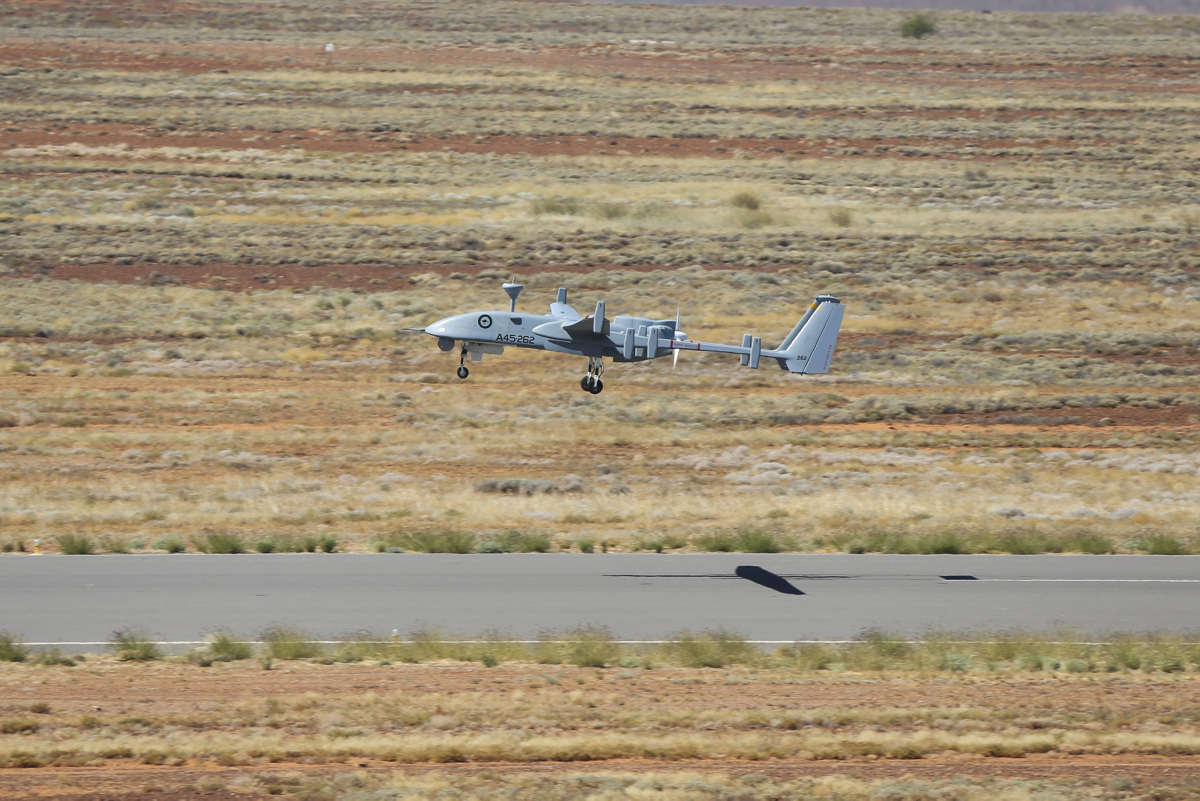
Robohub.org
The Drone Center’s Weekly Roundup: 8/14/17

Australia retired the IAI Heron drone after eight years of service. The Royal Australian Air Force is currently seeking a replacement. Image via Aviation Analysis Wing
August 7, 2017 – August 13, 2017
News
Two U.S. airstrikes targeted members of al-Shabab in Somalia. In a statement, the U.S. Africa Command said the strikes were “conducted within the parameters of the proposal approved by the President in March 2017.” A spokesperson said the strikes were carried out by drones. (ABC News)
In a classified guidance issued last month, the Department of Defense authorized the U.S. military to seize or destroy drones that appear to endanger the airspace or pose a threat to military installations. Pentagon spokesperson Captain Jeff Davis told reporters that the move was a response to the “increase of commercial and private drones” in the U.S. (Reuters)
An Iranian drone interfered with a U.S. F/A-18E Super Hornet jet in the Persian Gulf. In a statement, the U.S. military said that the drone flew within 100 feet of the manned fighter as it was preparing to land on the USS Nimitz. (Washington Post)
Turkish authorities have detained a Russian citizen with ties to ISIS for allegedly planning to use a drone to attack a U.S. military base. Police in Adana claim that Renad Bakiev admitted to reconnoitering Incirlik Air Base in southern Turkey. (Associated Press)
Commentary, Analysis, and Art
At the Financial Times, Louise Lucas writes that China-based drone manufacturer DJI is considering making a move toward the commercial sector.
At C4ISRNet, Jen Dunham argues that hiring more analysts won’t help the U.S. military analyze all the data from drones.
A report by CorpWatch examines the contractors and technologies that underpin U.S. military drone operations.
At Defense Tech, Oriana Pawlyk writes that U.S. MQ-9 Reaper drones are taking on more missions in Afghanistan.
At Air and Space Magazine, Tim Wright considers how recent events have impacted DJI’s brand image.
At Popular Science, Kelsey D. Atherton looks at why the U.S. Army recently issued a ban on DJI drones.
Also at Popular Science, Kendra Pierre-Louis looks at how the U.S. Forest Service is working to dissuade drone users from flying over wildfires.
At 9News, Mike Dalton profiles Carbonix, an Australian company that makes lightweight airframes for drones.
At the Wichita Eagle, Jerry Siebenmark looks at how drone companies in Kansas are adapting to changes in the drone industry.
ABC News visited a U.S. police department’s training facility to see how drones are aiding law enforcement operations.
At Defense News, David B. Larter writes that the U.S. Navy is exploring ways of using drones and artificial intelligence to repair damaged airfields.
At Offiziere, Paul Iddon writes that Turkey is moving to step up production of armed drones.
The Los Angeles Times editorial board argues that the Los Angeles County Sheriff should adopt a more transparent process for integrating drones into police work.
At the Wall Street Journal, Nicole Friedman writes that insurance companies are increasingly relying on drones to inspect physical damage to properties.
At the San Francisco Chronicle, Carolyn Said looks at how robots and drones are taking on more roles in food delivery.
At WFTV, Lauren Seabrook writes that a new state law in Florida that offers more opportunities for drone businesses conflicts with local drone ordinances.
At Drone Law Blog, Jonathan Rupprecht offers the pros and cons of the proposed Drone Operator Safety Act of 2017.
Know Your Drone
Kratos Defense and Security Solutions announced that a classified military drone that it is developing for an unnamed program will enter into production this year. (FlightGlobal)
General Atomics Electromagnetic Systems has modified its Fencepost acoustic surveillance system to function as a counter-drone device. (Aviation Week)
Northrop Grumman is using an X-47B drone as a testbed for the Navy’s MQ-25A Stingray aerial refueling drone. (Aviation Week) For more on the X-47B, click here.
Drones at Work
A drone hobbyist in Scotland managed to land an off-the-shelf consumer drone on the deck of the Royal Navy’s HMS Queen Elizabeth, a modern aircraft carrier. (The Telegraph)
The San Francisco Public Utilities Commission approved a policy to use drones for construction management, environmental monitoring, and inspection. (San Francisco Examiner)
The Worldview International Foundation is planning to use drones to plant tree seeds as part of a reforestation effort in Myanmar. (Fast Company)
The Kansas Department of Transportation and app maker AirMap are partnering to develop a drone air traffic management system. (The Wichita Eagle)
China is operating a dozen unmanned undersea vehicles for scientific observations in the South China Sea. (CNBC)
An Indian Air Force drone crashed during a flight over the Kathua district. (Indian Express)
Researchers from Cornell are using drones to measure surface reflectivity on the landscape as a means of studying climate change. (Phys.org)
The local government in Tamil Nadu is planning to use mapping drones for a flood mitigation project. (The Hindu)
Embry-Riddle Aeronautical University and the Daytona Beach Police Department are partnering to develop a police drone program. (Drone Life)
The Israeli Defence Ministry is investigating reports that defense firm Aeronautics was asked by Azerbaijan to carry out a live demonstration of a loitering munition drone against Armenian forces. (Jerusalem Post)
The Muriwai Surf Life Saving Club in New Zealand is planning to use drones for patrolling a popular beach. (News Hub)
Researchers who used a drone last year to collect pollutant samples from the open burning of waste at an Army ammunition facility in Virginia found arsenic and other pollutants. (Phys.org)
The Royal Australian Air Force has retired its Heron surveillance and reconnaissance drone. (Shephard Media)
The U.S. Air Force announced that it will participate in “ThunderDrone,” a competition to develop new drone capabilities. (DefenseNews)
Industry Intel
The U.S. Army awarded Lockheed Martin a $12.9 million contract for work on the Squad X Experimentation program. (DoD)
The U.S. Navy awarded Dragonfly Pictures a $2.84 million contract for research into unmanned maritime systems. (FBO)
The U.S. Air Force awarded Pretalen a $149,698 contract for ADS-B for unmanned aircraft operations. (FBO)
The U.S. Air Force awarded Raytheon a $25.9 million contract for upgrades to the sensors onboard the RQ-4 Global Hawk. (UPI)
The U.S. Air Force awarded KeyW a $24 million contract for research into Multi-Sensor Multi-Domain Fusion. (Press Release)
The U.S. Air Force awarded Endeavor Robotics a contract for 32 small unmanned ground vehicles. (Shephard Media)
Drone Aviation, a Florida-based manufacturer of tethered drones, raised $4 million in funding. (Press Release)
CB Insights identified the top 15 early-stage drone startups according to disclosed funding levels.
FlyNex, a German drone startup, reported closed a seven-figure seed funding round. (Finsmes)
Boston-based Altaeros raised $7.5 million in funding from SoftBank Group to use tethered aerostats to bring broadband wireless to rural areas. (TechCrunch)
For updates, news, and commentary, follow us on Twitter. The Weekly Drone Roundup is a newsletter from the Center for the Study of the Drone. It covers news, commentary, analysis and technology from the drone world. You can subscribe to the Roundup here.
tags: c-Aerial





